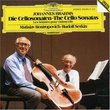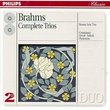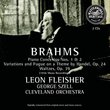| All Artists: Beethoven, Ormandy, Szell, Fleisher, Stern Title: Piano Concerti 1-5 / Triple Concerto Members Wishing: 1 Total Copies: 0 Label: Sony Original Release Date: 1/1/1992 Re-Release Date: 8/25/1992 Genre: Classical Styles: Forms & Genres, Concertos, Historical Periods, Classical (c.1770-1830), Modern, 20th, & 21st Century, Instruments, Keyboard, Strings, Symphonies Number of Discs: 3 SwapaCD Credits: 3 UPC: 074644839722 |
Search - Beethoven, Ormandy, Szell :: Piano Concerti 1-5 / Triple Concerto
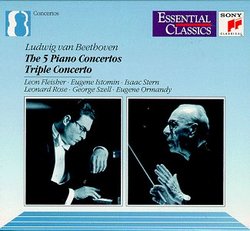 | Beethoven, Ormandy, Szell Piano Concerti 1-5 / Triple Concerto Genre: Classical
|
Larger Image |
CD DetailsSimilar CDs |
CD ReviewsHistoric Recordings! A Real Touchstone! D. J. Zabriskie | Park Ridge, NJ USA | 08/18/2003 (5 out of 5 stars) "Going on 40 years since they were recorded, Leon Fleisher's collaborations with George Szell and the Cleveland Orchestra on some of the greatest of all piano concerti, have gained legendary status among lovers of classical music... and for good reason. This collection of the complete Beethoven cycle gives ample proof of why this is so. George Szell was one of the greatest of all 20th century conductors. Unfortunately, with the passing of time he has also become one of the most overlooked. Like Toscanini and Solti, Szell was one of the last of the great Apollonarian conductors, whose goal it was to: "Play what is written, AS it is written." Toscanini and Solti both posessed an uncanny talent for getting their ensembles to play "over their heads" and transcend their individual and collective limitations. What Szell posessed was a better ORCHESTRA. By the time of these reccordings, Szell had built the Cleveland Orchestra into the finest in America at that time, and one of the very finest in the world. In Leon Fleisher, Szell found the perfect, like-minded collaborator. These are probably the most disciplined and rigorous recordings of these great masterworks you will ever hear. In revisiting these familiar scores, Fleisher and Szell set out to discover NOT was unique or new or interesting to them, but rather what BEETHOVEN put into them. The result is to give the listener something of invaluable beauty: the closest thing to Beethoven's intent as is humanly possible. This is not to say these performances lack passion, intensity and emotion. Far from it! But the passion, intensity and emotion here are simply what the music requires, nothing more. What these recordings communicate primarily and with greatest impact is the GENIUS of Beethoven. Only later does one become aware of the genius of the artists, in their willingness to sublimate their egos in pursuit of that goal. There are any number of simply superb performances of these works by some of the most astounding pianists of all time, from Josef Hoffman to Glenn Gould to Martha Argerich. All of them have their special virtues and their special pleasures. But THESE are the recordings you will compare all others to. They will form a permanent point of reference in their sobriety, their probity, their complete lack of affectation, and, ultimately, their GENIUS." Nothing else compares Todd Lifka | Spokane, WA United States | 01/04/2003 (5 out of 5 stars) "I owned the recording of Piano Concert No. 5 (Emperor) on CBS tape, way back when in the 70's, and bought it again on cassette tape when the first one wore out. Then the 2nd tape wore out, and I could not find it anywhere. I had to do without for like 15 years until not too long ago, doing a search on the web, discovered that it had been reproduced on CD and owned now by Sony. I was elated to get it again.I have listened to many artists' rendition of the Emperor and they all stink, by comparison. Fleisher's playing, along with this orchestra is nothing short of perfection!His playing skill was phenomenal. Other artists play the piano too slowly, and miss so much of the character of the piece, because many passages need "effect" that Fleisher brings out in his performance. I cry sometimes listening to this, because of how excellent it is.Another critic wrote about the Cleveland Orchestra and Fleisher on piano, saying that they work perfectly together, complementing one another in the most equisite ways, fully aware of one another, seeming to accent one another at perfect times, and laying back to allow each other their time of expression, also in the perfect way. He was so right in his analysis. This is as good as it gets! Buy it." Revisiting the Beethoven Piano Concertos Robin Friedman | Washington, D.C. United States | 06/08/2004 (5 out of 5 stars) "Beethoven's fourth and fifth piano concertos were among the first works I heard and loved in getting to know music too many years ago. The remaining three piano concertos did not lag far behind. I enjoyed greatly having the opportunity to listen closely again to each of the Beethoven piano concertos in this outstanding collaboration between George Szell and the Cleveland Orchestra and pianist Leon Fleisher. This set was originally recorded in the early 1960s. The performances of the orchestra and pianist are driven and passionate. There is no better introduction to this music for those listeners new to the Beethoven concertos. In addition this box set is available at a low price.As a young man in Vienna, Beethoven first tried to make his way as a performer with a virtuosic and improvisatory piano technique. With the exception of the "Emperor" Concerto, Beethoven wrote these works to perform himself in order to display his prodigous command of the keyboard.The first two piano concertos are early works showing Beethoven heavily under the influence of Mozart, the master of the classical piano concerto. The concerto no. 2 in B-flat major, opus 19, was the first of the pair and is one of the earliest of Beethoven's major orchestral compositions. Its early versions probably were composed before Beethoven moved to Vienna, and it was revised repeatedly thereafter. Beethoven completed the work in 1798, and premiered it in Vienna and Prague. It is the most Mozartean of Beethoven's compositions, and Beethoven in later years expressed some dissatisfaction with it. It will still delight the listener.The first concerto, in C major, opus 15 has substantially more snap and drama than the earlier concerto. It also features a highly difficult and virtuosic cadenza that Beethoven composed for this score at a later time. Beethoven completed this concerto in 1800. It features a song-like, trilling slow movement, a march-like opening movement, and a virtuosic rondo finale.Over the years, Beethoven's third piano concerto in c-minor, opus 37 has grown the most on me. This work is modeled on Mozart's c-minor piano concerto, but it represents a distinct break from the first and second concertos. The work stands literally on the edge between Beethoven's first and second periods of composition. The work begins with a long, dark orchestral introduction. The piano writing is virtuosic and by turns angry and dramatic and lyrical. The second movement of the concerto is in a major key remote from c minor. It is intense and lyrical featuring a flowing theme in the cellos together with the piano. The third movement is a skipping dance which breaks into an exultant presto at the end. This work has some rough edges when compared to Mozart's but it is an undoubted masterpiece in its own right. Beethoven first performed this concerto in 1803 at a concert which also included the Second Symphony and the oratorio, Christ on the Mount of Olives.The fourth concerto in G major, opus 58, represents a distinct stylistic break. The work opens with a short, meditative statement of the theme in the solo piano, followed by the orchestral exposition which opens in a remote key. The work is mostly quiet and lyrical and features great interplay between the piano and the orchestra. This is highlighted in the slow movement which consists of a dialogue between a brusque orchestra and a pleading soloist -- with the two never playing together. The work was completed in 1805, and Beethoven performed it in 1808.Beethoven's final piano concerto, which has become almost the prototype of the piano concerto, is the famous "Emperor" in E-flat major opus 73. This work, together with Beethoven's "Eroica" symphony also in E-flat major virtually define Beethoven's "heroic" period for many listeners. This is a flamboyant work which opens with crashing chords and brilliant piano arpeggios a and includes crashing chords and difficult double octaves in its development section. The work also unites the solo part with the orchestra to make the work one of large, symphonic proportions. There are some modern listeners who feel uncomfortable with music of this sweep and grandeur. In his recent book "Beethoven: the Music and the Life" (2003), Lewis Lockwood commented on this tendency (page 251): "To [t]his pessimism there is no final response except that provided by listeners and musicians who seem to arise in every new generation and regard works such as the Eroica and the 'Emperor' Concerto as among their most significan personal experiences. Listeners accept them not as antiquated expressions of a political idealism that has been cruelly banished by history, but as evocations of the human possibilities that might be realized in a better world."This collection also included Beethoven's "Triple" concerto in C major for piano, violing, and cello, opus 56 performed by Eugene Ormandy and the Philadelphia Orchestra with Eugene Istomin, piano, Issac Stern, violin, and Leonard Rose, cello. The cello has the largest solo role in this work and is highly difficult to play. The piano solo was composed for a musical amateur. The Triple Concerto has had its critics over the years. I enjoy it. The music is laid-back and diffuse and does not show the same level of inspiration as do the piano concertos.This box set is the ideal way to get to know, or to revisit, Beethoven's piano concertos. The new listener will cherish these works over the years. This disk will encourage the listeners to explore and love this music and related art music."
|

 Track Listings (6) - Disc #1
Track Listings (6) - Disc #1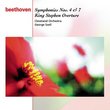
![George Szell Plays and Conducts Mozart [Box Set]](https://nationalbookswap.com/cd//m/82/5782/6145782.jpg)
